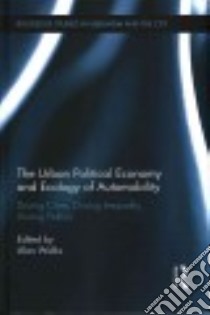The Urban Political Economy and Ecology of Automobility - 9780415706155
Un libro in lingua di Walks Alan (EDT) edito da Routledge, 2014
- € 164.60
- Il prezzo è variabile in funzione del cambio della valuta d’origine
"Just how resilient are our urban societies (to energy, environmental and/or financial shocks, etc), and how does this vary among cities and nations? Can our cities be made more sustainable, and can environmental, economic, and social collapse be staved off through changes in urban form and travel behaviour? How might the recent series of financial crises be related to automobile dependence and patterns of urban automobile use? What is the influence of the automobile in the production of urban socio-spatial inequalities, and how might inequalities in mobility be understood and measured? What has been the role of automobility, and auto-dependence, in differentiating forms of citizenship, both within cities and rural areas, and among transnational migrants moving across international borders? How is the auto-mobile city implicated in the rise of neoliberal ideology, and how has it affected electoral campaigns and results? What can we learn from the politics of mobility and social movements within cities? What can we do to fashion more socially just and resilient cities? These are some of the questions this book addresses. This volume provides an holistic and reflexive account of the role played by automobility in producing, reproducing, and differentiating social, economic and political life in the contemporary city, as well as the role played by the city in producing and reproducing auto-mobile inequalities. The first section, titled Driving Vulnerability, deals with issues of global importance related to economic, social, financial, and environmental sustainability and resilience, and socialization. The second section, Driving Urban Inequality, is concerned with understanding the role played by automobility in producing urban socio-spatial inequalities,including those rooted in accessibility to work, migration status and ethnic concentration, and new measures of mobility-based inequality derived from the concept of effective speed. The third section, titled, Driving Urban Politics, explores the politics of mobility in particular places, with an eye to demonstrating both the relevance of the politics of mobility for influencing and reinforcing actually existing neoliberalism, and the kinds of politics that might allow for reform or restructuring of theauto-mobile city into one that is more socially, politically and environmentally just. The conclusion to the book draws on the findings of the other chapters to comment on the relationship between automobility, neoliberalism, and citizenship, and to lay out strategies for dealing with the urban car system. The book is original and useful in advancing the body of knowledge through the application of abstract concepts in the automobility literature to the study of the city, but also by providing in each chapter comparative empirical analysis quantifying a range of measures by which such concepts were applied. The book will be useful for those working on theorizing the city and automobility, and those conducting empirical analyses on these issues (mobility-based inequalities and as a guide for political strategizing and negotiating the politics and policies of the auto-mobile city. "--
Informazioni bibliografiche
- Titolo del Libro in lingua: The Urban Political Economy and Ecology of Automobility
- Sottotitolo: Driving Cities, Driving Inequality, Driving Politics
- Lingua: English
- Autore: Walks Alan (EDT)
- Editore: Routledge
- Collana: Routledge (Hardcover)
- Data di Pubblicazione: 08 Luglio '14
- Genere: SOCIAL SCIENCE
- Argomenti : Automobiles Social aspects Cities and towns Urbanization
- Pagine: 331
- Dimensioni mm: 234 x 158 x 25
- EAN-13: 9780415706155


